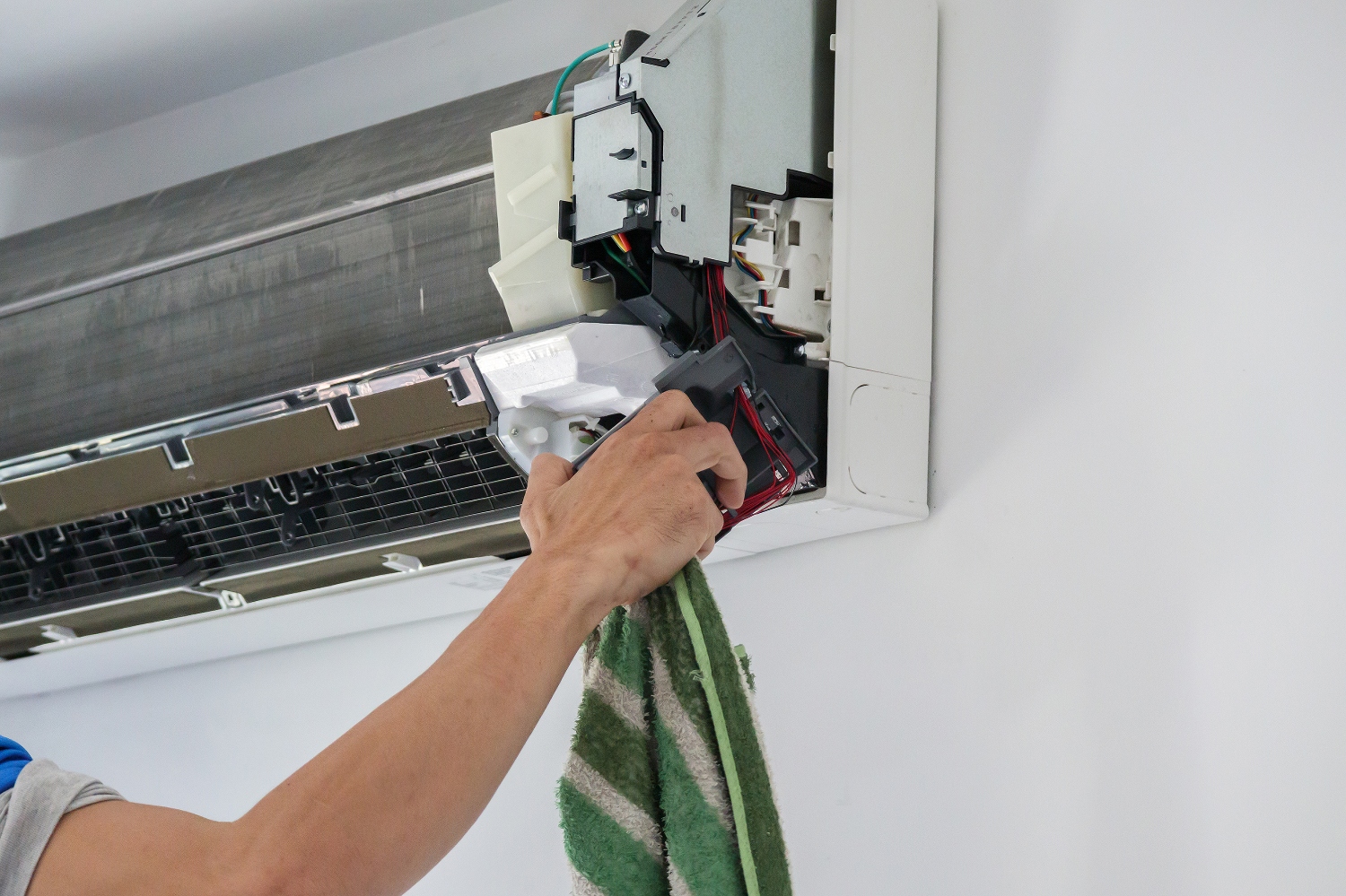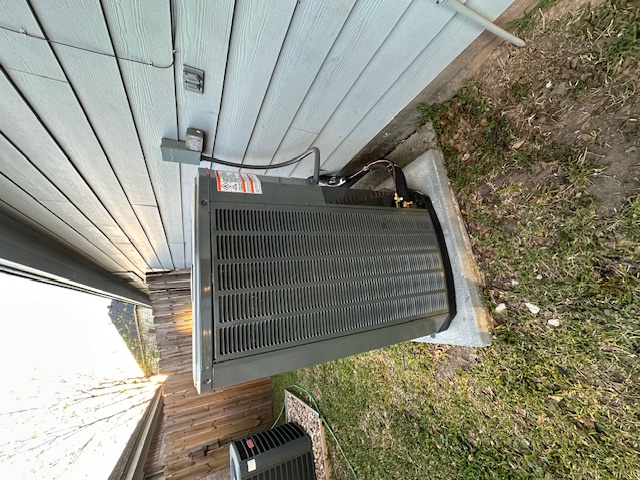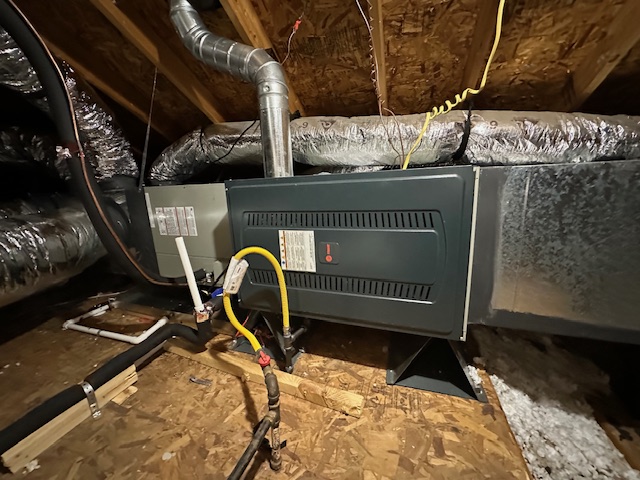When summer temperatures soar, a leaking air conditioner can quickly turn your cool home into an uncomfortable sauna. AC refrigerant leaks are among the most common issues homeowners face during hot months,
A refrigerant leak can cause your AC unit to run longer than normal, increase your utility bills, and make your system blow warm air instead of cool air.
These leaks typically happen for several reasons including normal wear and tear, corrosion of copper tubing, factory defects, or damage during installation. Age is also a significant factor - older systems are more prone to developing cracks and holes in the refrigerant lines.
We understand how frustrating AC problems can be during summer's hottest days. While some maintenance tasks can be handled yourself, refrigerant leaks require professional attention due to the specialized equipment needed and environmental regulations around refrigerant handling.
In this article, you’ll learn how to identify, prevent, and fix AC leaks, whether it’s refrigerant or water, before they escalate during peak summer.
Let’s break down the key points you should consider:
- Why your AC might be leaking (and how to spot it early)
- Most common causes of AC leaks
- How AC leaks are diagnosed and repaired
- Get fast AC leak repair in houston with Horizon air solutions
Keep reading to learn how quick detection and repair not only restore your comfort but also prevent additional strain on your system and avoid more costly repairs down the road.
Why your AC might be leaking (and how to spot it early)
Air conditioner leaks typically fall into two categories: refrigerant leaks and water leaks. Identifying these issues early can save you from expensive repairs and system failures during the hottest days of summer.
Signs your system is leaking refrigerant
Refrigerant is essential for your AC to cool your home properly. When it leaks, your system's cooling ability decreases significantly. Watch for these warning signs:
- Hissing sounds coming from your AC unit or refrigerant lines
- Longer cooling cycles with less effective cooling
- Ice formation on the evaporator coils or refrigerant lines
- Warm air blowing from vents when set to cool
Refrigerant leaks require professional attention because handling refrigerant is regulated by law. HVAC technicians use specialized detection equipment to find the exact source of leaks.
Most refrigerant leaks occur due to corrosion in coils, vibration damage to connections, or factory defects in components. These issues worsen over time, so addressing them early prevents complete system breakdown.
What it means when your ac is dripping water indoors
Water leaking from your indoor unit indicates a different problem than refrigerant leaks. Your air conditioner naturally produces condensation during operation.
The most common causes of indoor water leaks include:
- Clogged condensate drain line preventing proper water drainage
- Dirty air filters reducing airflow and causing evaporator coil freezing
- Cracked or damaged drain pan unable to hold condensation
- Improper installation with insufficient slope for drainage
You can prevent many water leaks with regular maintenance. Change your air filters every 1-3 months and clean your condensate drain line with vinegar or special cleaning tablets quarterly.
For immediate fixes, you can try clearing the drain line with a wet/dry vacuum or carefully cleaning the drain pan area. However, persistent leaks often require professional assessment.
Mold, weak cooling, and high energy bills
Untreated AC leaks lead to several serious secondary problems in your home. These issues affect both comfort and finances.
Mold growth often occurs when moisture from leaks creates ideal conditions in dark spaces. Look for:
- Musty odors when the AC runs
- Visible mold around air vents or the air handler
- Increased allergy symptoms among household members
Poor cooling performance happens when refrigerant levels drop or airflow is restricted. Your system works harder but produces less cooling.
Energy bills spike because leak-affected systems run longer cycles trying to reach the set temperature. We often see 20-30% higher electricity costs in homes with leaking air conditioners.
Regular professional maintenance can identify these issues before they become serious problems. Having your system checked each spring helps ensure leak-free operation throughout summer.
Most common causes of AC leaks
When your AC unit starts leaking water, it's usually caused by one of several common issues that affect the condensation process or the components that manage moisture.
According to the EPA, improper installation practices, especially poorly sealed joints and flare fittings, are a primary cause of refrigerant leaks and should always be tested for leak-tightness after setup
Clogged condensate drain line
The condensate drain line is the most frequent culprit behind AC water leaks. This PVC pipe carries away the moisture your AC removes from indoor air. Over time, it can become clogged with:
- Dirt and debris
- Mold growth
- Algae buildup
- Dust accumulation
When blocked, water backs up into your system and eventually overflows. You might notice water pooling around your indoor unit or dripping from the ceiling near your air handler.
To check for this issue, look for standing water in the drain pan or water overflow marks. The fix can be relatively simple - using a wet/dry vacuum to suction out the clog or flushing the line with vinegar solution.
Regular maintenance prevents this problem. We recommend pouring a cup of vinegar down the line every 1-3 months during heavy usage periods.
Frozen evaporator coil
The evaporator coil can freeze when something disrupts normal airflow or refrigerant flow through your system. When the ice eventually melts, it creates excess water that overwhelms the drain system.
Common causes of coil freezing include:
- Dirty air filters restricting airflow
- Low refrigerant levels
- Blower motor problems
- Extremely low thermostat settings
You'll often notice reduced cooling performance before the leak appears. When the coil freezes, your AC might blow warm air or stop cooling entirely.
To fix this issue, first turn off your AC to allow complete defrosting. Replace dirty air filters immediately. If the problem persists, you'll need professional help to check refrigerant levels or repair mechanical issues.
Damaged or rusted drain pan
The drain pan catches condensation as it drips off the evaporator coil. Over time, these pans can:
- Develop rust spots
- Crack from age or damage
- Warp from heat cycles
- Corrode at seams or joints
An older AC unit is particularly susceptible to drain pan problems. Units over 10 years old often show metal fatigue in these components.
Identifying this issue requires visual inspection of the drain pan for holes, cracks, or significant rust. For a temporary fix, you can use water-resistant tape or sealant designed for HVAC applications.
The proper solution usually involves replacing the drain pan entirely. In older units, this might signal it's time to consider a system upgrade.
Refrigerant leak in coils or line set
Refrigerant leaks are a serious issue that causes both performance problems and water leakage. When refrigerant levels drop, the evaporator coil can't maintain proper temperature, leading to freezing and subsequent melting.
Signs of a refrigerant leak include:
- Diminished cooling capacity
- Hissing sounds near coils or copper lines
- Ice formation on the refrigerant line
- Rising energy bills despite normal usage
Unlike other causes, refrigerant leaks require professional attention. The technician will need specialized equipment to:
- Locate the leak using detection tools
- Repair the damaged component
- Recharge the system with the correct refrigerant type and amount
DIY repairs are not recommended for refrigerant issues due to environmental regulations and technical complexity.
How AC leaks are diagnosed and repaired
Detecting and fixing AC leaks requires proper diagnosis and expert repair techniques. Professional HVAC technicians follow systematic approaches to find leaks and implement lasting solutions that restore your cooling system to optimal performance.
Leak detection methods HVAC techs use
HVAC technicians use several specialized methods to locate refrigerant leaks in air conditioning systems. Electronic leak detectors are highly sensitive devices that can sense even tiny amounts of refrigerant in the air. These handheld tools beep or flash when refrigerant is detected.
UV dye tests involve adding fluorescent dye to the system and allowing it to circulate. Technicians then use UV lights to spot the bright dye where it has escaped from the system. This method is particularly effective for finding hard-to-spot leaks.
Soap bubble tests are simple but effective. Technicians apply soapy water to suspected leak areas and watch for bubbles forming when refrigerant escapes.
Nitrogen pressure tests involve removing refrigerant, pressurizing the system with nitrogen, and monitoring for pressure drops that indicate leaks. This method helps identify the exact location of even small leaks.
Why DIY AC leak sealers rarely work
Store-bought AC leak sealers promise an easy fix but typically deliver disappointing results. These products contain chemicals that supposedly seal small holes when they contact air, but they often create more problems than they solve.
The sealant can clog vital components like the expansion valve or accumulator, causing system-wide failures that cost much more to repair than the original leak. These products also can't fix larger leaks or address underlying issues.
Many HVAC warranties become void if DIY sealants are used in the system. Professional technicians can immediately identify when these products have been used.
We've seen countless systems damaged by these quick-fix solutions. The temporary nature of these repairs means the leak typically returns within weeks, requiring professional intervention anyway.
Industry reports estimate that an undetected refrigerant leak can cost homeowners up to $1,600 in repair and inefficiency-related expenses, making early professional intervention essential.
Replacing Vs patching a damaged line or pan
When faced with a leaking refrigerant line, technicians must decide whether to patch or replace it. Small pinhole leaks in accessible copper lines can sometimes be soldered closed, offering a cost-effective solution for minor problems.
However, replacement is often the better long-term solution. Patched lines may develop new leaks nearby, as the original damage might indicate weakening throughout that section. Replacing the entire component ensures better system reliability.
For condensate drain pans, replacement is typically recommended over patching. Drain pans often corrode over time, and patching one area doesn't address the overall deterioration.
The decision factors include the component's age, accessibility, and the extent of damage. Lines in hard-to-reach areas might require more extensive work regardless of the repair approach chosen.
How long AC leak repairs typically take
Most straightforward AC leak repairs take between 1-3 hours once the leak has been located. The diagnosis process itself can add 1-2 hours depending on the leak's complexity and location.
Simple condensate drain pan replacements are typically completed in about 2 hours. These repairs are straightforward as the pan is usually accessible and the repair process is standardized.
Refrigerant line repairs can vary significantly in time. Accessible lines might be fixed in under 2 hours, while lines buried in walls or difficult locations might require 4-6 hours of labor.
System evacuation and recharging add about an hour to any refrigerant repair. This critical step removes moisture and air from the system before adding the precise amount of new refrigerant.
We recommend scheduling a full day for the repair to account for unexpected complications, though most repairs are completed in a half-day service call.
Get fast AC leak repair in houston with Horizon air solutions
When your AC is leaking water or refrigerant in Houston's heat, quick professional help is essential. Horizon Air Solutions offers 24/7 emergency response with fully licensed technicians who provide transparent pricing and long-term solutions.
Emergency response for refrigerant and water leaks
AC leaks demand immediate attention, especially during Houston's hot summer months. We understand that when your system leaks refrigerant, it not only stops cooling effectively but can also damage important components. Water leaks from condensate drain issues can cause structural damage to your home if left untreated.
Our emergency response team is available around the clock to address these urgent situations. We typically arrive within hours of your call, not days. This rapid response helps prevent further damage to both your AC system and your home.
We bring specialized equipment to detect and fix refrigerant leaks accurately. For water leaks, we clear blocked drain lines and repair damaged drain pans to get your system back to normal quickly.
Fully licensed HVAC technicians available 24/7
Our team consists of fully licensed and certified HVAC professionals with extensive experience repairing all major AC brands. Each technician undergoes regular training to stay current with the latest repair techniques and technology.
Available 24 hours a day, 7 days a week, we're ready to handle your AC emergencies whenever they occur. Houston's climate doesn't take days off, and neither do we.
Our technicians arrive in fully-stocked service vehicles with the parts and tools needed to complete most repairs in a single visit. This saves you time and gets your home comfortable again faster.
We follow strict safety protocols and adhere to all industry standards when handling refrigerants and electrical components. Your safety and satisfaction are our top priorities.
Transparent pricing and long-term fixes
We believe in honest, upfront pricing with no hidden fees or surprise costs. Before beginning any work, we provide a detailed estimate that clearly explains the issue and recommended repairs.
Our technicians focus on identifying and fixing the root cause of leaks, not just treating symptoms. This approach prevents recurring problems and saves you money in the long run.
We offer multiple repair options at different price points whenever possible. This helps you make informed decisions based on your budget and needs.
All our repairs come with a satisfaction guarantee and warranty on parts and labor. If an issue persists after repair, we'll return to fix it at no additional cost to you.
Cooling system tune-up included with repairs
Every AC leak repair from Horizon Air Solutions includes a comprehensive system tune-up at no extra charge. This helps ensure your entire cooling system operates efficiently after repairs.
During the tune-up, we check refrigerant levels, clean coils, inspect electrical connections, and test overall system performance. This thorough approach often identifies small issues before they become major problems.
The included tune-up typically improves energy efficiency by 5-10%, which can translate to noticeable savings on your utility bills. It also extends the lifespan of your equipment.
We provide a detailed report of our findings and recommendations for maintaining optimal performance. Many customers appreciate this educational aspect of our service, as it helps them better understand their cooling system.
Conclusion
AC leaks during summer can be frustrating but are often fixable with the right approach. Regular maintenance is key to preventing most water leakage issues before they start.
We recommend cleaning or replacing air filters monthly during heavy use periods. This simple step prevents many problems like frozen coils and subsequent leaks.
Check your condensate drain line regularly and clean it with vinegar solution quarterly. This prevents the most common cause of AC leaks - clogged drain lines.
For refrigerant leaks or electrical issues, it's best to call professionals. These problems require specialized tools and knowledge to fix safely and effectively.
Don't ignore small leaks as they often indicate developing problems. Quick action can prevent expensive repairs and water damage to your home.
By staying proactive with maintenance and addressing minor issues promptly, you can enjoy reliable cooling all summer long without unexpected leaks disrupting your comfort.
Need urgent AC leak repair in Houston? Schedule a same-day service with Horizon Air and get your cooling system back to full performance fast.











